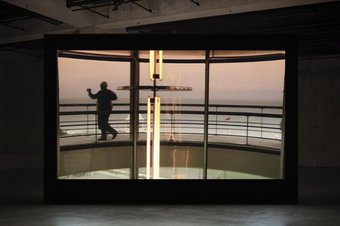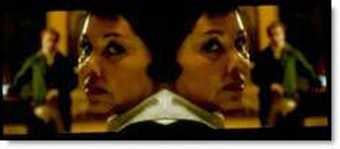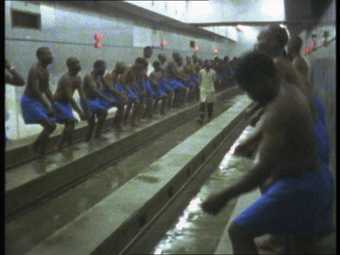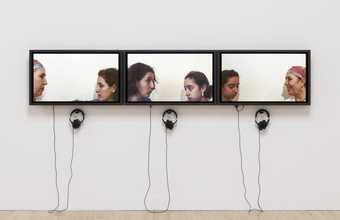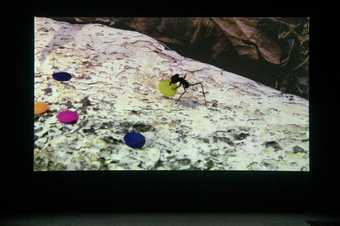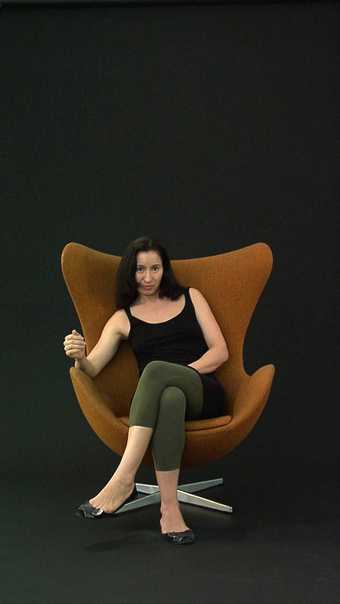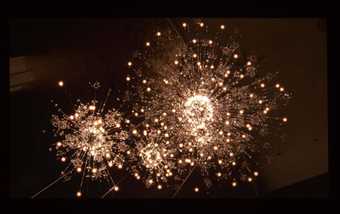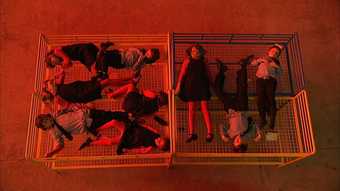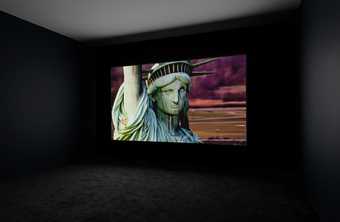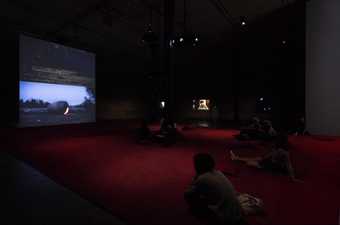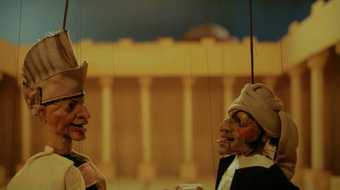
Not on display
- Artist
- Sir John Akomfrah CBE born 1957
- Medium
- Video, high definition, 3 projections, colour and sound (surround)
- Dimensions
- Duration: 45min
- Collection
- Tate
- Acquisition
- Purchased jointly by Tate and the British Council with assistance from the Art Fund 2014
- Reference
- T14105
Summary
The Unfinished Conversation 2012 is a three-screen video installation that explores the multi-layered and ever-evolving subject of identity through an exploration of the memories and archives of the acclaimed British cultural theorist and sociologist Stuart Hall (1932–2014). The film is narrated in a non-linear format and unfolds over three screens, bringing up a variety of disparate footage simultaneously. This process examines the nature of the visual as triggered across an individual’s memory. Extracted images from news footage of the 1960s, alongside Hall’s personal home videos and photographs, are presented to merge the past, present and future. Akomfrah weaves issues of cultural identity into the film using a wide range of reference, overlaying archive footage of Hall with a soundtrack made up of jazz and gospel music and readings from a wide range of authors, including William Blake, Charles Dickens, Virginia Woolf and Mervyn Peake.
In the footage used in Unfinished Conversation Hall discusses his discovery of his personal and ethnic identity. Born in Kingston, Jamaica into a middle class family where he was the ‘darkest’ member, he quickly found that this had an immense effect on his upbringing in Jamaica. He arrived in Britain as a young man in 1951, graduated from Oxford University and went on to become one of the founding figures of British Cultural Studies and a strong voice on the journal New Left Review, alongside other intellectuals such as E.P. Thompson and Raymond Williams. Hall’s arrival in Britain in the early 1950s was only shortly after the ‘Windrush generation’, whose arrival on board the SS Empire Windrush in 1948 marked the start of post-war mass migration from the Caribbean to England. Hall married an English woman and, in 1968, defined himself for the first time not as West Indian (he is of mixed Portuguese-Jewish, African and English descent) but as ‘black’ – a political identity that frames his evolving idea of multiculturalism. Akomfrah’s film, which only focuses on Hall’s formative years of the 1950s and 1960s, also encompasses wider international political changes, for example the Soviet invasion of Hungary, the Vietnam war and the riots in Britain. Akomfrah’s use of different footage and multiple screens also portrays how identity is formed as part of a collision of history, culture and politics. Identity is presented as a conjunction of the outside and the inside, where individual subjectivities are formed in both real and fictive spaces.
The title of the work refers to Hall’s exposition of identity. According to Hall, identity is not an essence or being, but instead a becoming that is part of an ‘ever-unfinished conversation’. The exploration of Hall’s memory is used with a variety of images intermingling with poetic soundscapes. Akomfrah has credited the immense influence Stuart Hall has had on his practice, particularly during the time of the artist’s involvement with the Black Audio Film Collective (BAFC, 1982–98), of which he was a founder member. When BAFC’s film Handsworth Songs 1986 (Tate T12862) was attacked by the writer Salman Rushdie in a review in the Guardian in 1987, Hall was a strong advocate for the group. The Unfinished Conversation was made over a period of three and a half years during which time Akomfrah worked closely with Hall.
The three-screen video installation has been shown in a variety of significant Biennials and exhibitions including the Sharjah Biennial, Taipei Biennial and Liverpool Biennial, all in 2012, and at New Art Exchange, Nottingham and Tate Britain, London in 2013. The film has also been edited for a single-screen theatre presentation entitled The Stuart Hall Project (95 minutes), which was nominated for the Grand Jury Prize at Sundance Film Festival in January 2013. The installation exists in an edition of five, of which Tate’s copy is number one.
Further reading
Kodwo Eshun and Anjalika Sagar (eds.), Ghost of Songs: The Film Art of the Black Audio Film Collective, Liverpool 2007.
New Art Exchange: John Akomfrah in Conversation, film, May 2013, http://www.youtube.com/watch?v=h6g6WyJ99Bw, accessed November 2013.
Leyla Fakhr
November 2013
Does this text contain inaccurate information or language that you feel we should improve or change? We would like to hear from you.
Film and audio
Explore
- architecture(30,960)
- townscapes / man-made features(21,603)
-
- street(1,623)
- emotions and human qualities(5,345)
-
- memory(367)
- photographic(4,673)
- history(1,983)
- music and entertainment(2,331)
-
- music, jazz(7)
- body(4,878)
-
- head / face(2,497)
- boy(1,153)
- black(796)
- Blake, William(25)
- Hall, Stuart(1)
- Peake, Mervyn(3)
- Woolf, Virginia(150)
- lifestyle and culture(10,247)
-
- cultural identity(7,943)
- Gospel music(1)
- jazz(602)
- colonialism(429)
- multiculturism(7)
- arts and entertainment(7,210)
-
- art theorist(77)
You might like
-
Ian Breakwell The Other Side
2002 -
Sir Isaac Julien CBE RA Vagabondia
2000 -
Sir Steve McQueen Caribs’ Leap/Western Deep
2002 -
Zineb Sedira Mother Tongue
2002 -
Rivane Neuenschwander, Cao Guimarães Quarta-Feira de Cinzas / Epilogue
2006 -
Andrea Fraser Projection
2008 -
Lindsay Seers Extramission 6 (Black Maria)
2009 -
Josiah McElheny Island Universe
2005–8 -
Dominique Gonzalez-Foerster Noreturn
2009 -
Sir Steve McQueen Static
2009 -
Apichatpong Weerasethakul Primitive
2009 -
Wael Shawky Cabaret Crusades: The Horror Show Files
2010 -
Catherine Yass High Wire
2008 -
Grada Kilomba Illusions Vol. I, Narcissus and Echo
2017 -
Buhlebezwe Siwani Amahubo
2018

